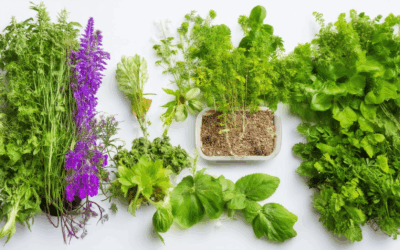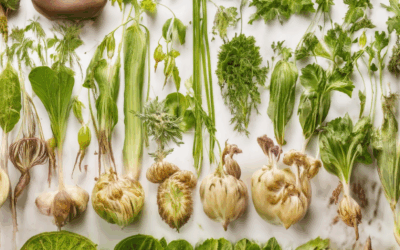Gardening is a passion that brings joy and beauty to our lives, but it can also pose challenges, especially when dealing with unwanted weeds and pests. For years, chemical herbicides have been a go-to solution for many gardeners, offering quick results and a false sense of security. However, the environmental impact and potential health risks associated with these chemicals are becoming increasingly concerning. As awareness grows, more people are seeking natural herbicide alternatives that are both effective and eco-friendly. In this article, we delve into the world of natural alternatives, exploring everything from simple DIY solutions to sustainable practices that can transform your garden. Whether you’re looking to reduce chemical exposure, promote soil health, or minimize harm to beneficial insects, we’ve got you covered. Join us as we uncover the power of natural solutions and discover how you can achieve a thriving, healthier garden without compromising on results.
Key Takeaways
– Discover Effective Natural Herbicide Alternatives: Explore powerful, eco-friendly solutions to protect your garden without harmful chemicals.
– Neem Oil: A versatile natural pesticide and fungicide, perfect for combating pests and diseases safely.
– Basil Oil: Repel pests with this aromatic oil, known for its effectiveness and pleasant scent.
– Epsom Salt: Use this multipurpose solution as both a fertilizer and a fungicide for healthy plant growth.
– Cinnamon: Safely repel aphids and other pests with this natural insecticidal dust.
– Garlic: Strengthen your garden defense with garlic extract, a potent solution against aphids and spider mites.
– Diatomaceous Earth: A natural desiccant that effectively dries out pests while remaining safe for plants and people.
– Sodium Carbonate: Tackle fungal issues with this easy-to-use natural fungicide.
– Chili Powder: Repel pests with capsaicin, a natural deterrent that’s safe for plants.
– Orange Oil: Protect your fruit trees and ornamentals with this citrus-derived pest repellent.
These natural herbicide alternatives offer effective, safe solutions for your garden, promoting a healthier ecosystem.
Best Natural Herbicide Alternatives
When seeking natural herbicide alternatives, there are several effective options that offer safer and more environmentally friendly solutions compared to synthetic chemicals. These alternatives can help control weeds, pests, and unwanted plant growth while minimizing harm to people, pets, and the planet.
- White Vinegar Spray: A simple and effective option, white vinegar mixed with water can kill weeds and fungi. Apply directly to affected areas, ensuring thorough coverage for best results.
- Salt Solution: Dissolve salt in water and spray onto weeds. This method is particularly effective for controlling invasive species like quackgrass.
- Essential Oils: Neem oil, peppermint oil, and rosemary oil are natural pesticides that can repel pests and kill weeds. Mix a few drops with water and apply carefully.
- Cornmeal Paste: Create a paste by mixing cornmeal with water and apply directly to weeds. This method works well for spot treatment.
- Compost and Mulch: Applying compost or mulch can suppress weeds by providing competition and reducing soil pH, making it harder for weeds to thrive.
- Physical Barriers: Use barriers like cardboard, plastic, or metal nets to prevent weeds from growing through certain areas.
- Borax and Water Solution: A mixture of borax and water can be sprayed onto weeds to kill them, though it’s important to avoid using it near desirable plants.
- Herbaceous Chrome Dye: A natural dye made from chromate can be applied as a spray to kill weeds, though it requires careful handling and application.
- Ancient Rock Dust: Rock dust like limestone or granite can be applied to suppress weeds by altering soil pH and reducing nutrient availability.
For best results, ensure proper dilution and application methods. Many of these options work best when applied during specific times of the year or under certain conditions. Always test on a small area before full application to avoid unintended damage.
These natural herbicide alternatives provide a variety of approaches to manage unwanted plants, from chemical-free sprays to physical barriers. By choosing eco-friendly methods, you can maintain your garden while promoting sustainability and environmental health.
What Are Some Natural Herbicide Alternatives?
Natural herbicide alternatives offer a safe and effective way to control weeds and unwanted plants in your garden or yard. By using natural methods, you can protect your plants and the environment while reducing chemical exposure.
Common Natural Herbicides and Their Uses
- Vinegar Solution: Mix equal parts water and white vinegar. Apply directly to weeds, being careful not to harm desired plants. Works best in sunny conditions.
- Saltwater Solution: Create a saline solution by dissolving 1 cup of salt in 10 gallons of water. Spray onto affected areas to kill weeds over time.
- Baking Soda Solution: Make a paste with 1 part baking soda and 2 parts water. Apply to weeds on surfaces like sidewalks or driveways for a natural cleaning effect.
- Dish Soap Solution: Combine 1 teaspoon of liquid dish soap with 1 gallon of water. Use as a spray to target weeds without harming plants.
How to Effectively Apply Natural Herbicides
- Timing: Apply natural herbicides in the early morning or late afternoon to avoid killing beneficial plants and to allow the solution to absorb quickly.
- Concentration: Follow the instructions carefully to avoid damaging surrounding plants. Use the lowest concentration needed for effective results.
- Reapplication: Monitor the area and reapply as needed, especially after heavy rain or watering.
When to Choose Natural Herbicides
- For small-scale weed control around flowers, vegetables, and ornamental plants.
- For use on walkways, patios, and other non-plant areas.
- As a complement to mechanical removal or manual weeding.
Conclusion
Using natural herbicides is a great way to maintain your garden without relying on harmful chemicals. By choosing eco-friendly options like vinegar, saltwater, baking soda, and dish soap, you can safely control weeds while protecting your plants and the environment. For more tips and detailed guides, explore our gardening resources at Old Seed .
What Are the Best Natural Alternatives to Chemical Herbicides and Pesticides?
When seeking effective alternatives to chemical herbicides and pesticides, consider natural options that are safe for the environment and people. These solutions can help protect your garden while promoting sustainability.
- Vinegar Solution: Mix equal parts water and white vinegar for a natural weed killer. Apply directly to unwanted plants, avoiding harm to beneficial organisms.
- Baking Soda: Create a paste with baking soda and water to treat powdery mildew on plants. Apply gently to affected areas for a natural cleaning effect.
- Compost: Incorporate organic compost into your soil to boost plant health and reduce pests naturally. It acts as a natural deterrent and promotes biodiversity.
- Neem Oil: Neem oil is a powerful natural pesticide. Dilute it with water and apply to affected plants to combat common pests like aphids and spider mites.
- Essential Oils: Use essential oils like peppermint or eucalyptus as natural insect repellents. Mix with a base oil and apply to plants or surfaces to deter pests.
- Saltwater Solution: Apply a saline solution to plants to repel pests and promote plant health. Use 1 teaspoon of salt per gallon of water and spray lightly.
- Dish Soap Solution: Combine dish soap with water for a natural way to kill soft-bodied insects like aphids. Apply thoroughly to affected areas.
For more information on these natural alternatives and sustainable gardening practices, explore our sustainable gardening guide and discover how to create an eco-friendly garden space.
Most Effective Natural Herbicide Alternatives
Natural herbicides offer a safe and eco-friendly alternative to chemical pesticides. Here are some of the most effective natural herbicide alternatives you can use:
- Neem Oil : Derived from the neem tree, neem oil is a powerful natural pesticide. It works by suffocating insects and fungi, making it effective against common garden pests like aphids, spider mites, and powdery mildew.
- Basil Oil : Extracted from basil plants, basil oil repels many insect pests and is known to kill common garden pests like mosquitoes and flies. It also has a pleasant scent, making it a good option for organic gardens.
- Epsom Salt : While primarily known for its use with plants, epsom salt can also act as a natural fungicide. It helps prevent and treat fungal infections in plants, such as powdery mildew and root rot.
- Cinnamon : Cinnamon is a natural insecticidal dust that repels ants, aphids, and other small insects. It’s safe to use around plants and people, making it a great option for households with pets or children.
- Garlic : Garlic extract is a natural pesticide that can be diluted and sprayed on plants to repel various pests. It’s particularly effective against aphids and spider mites.
- Diatomaceous Earth : Made from fossilized remains of tiny marine organisms, diatomaceous earth is a natural desiccant that kills insects by drying them out. It’s safe for use around plants and animals, making it a versatile option for pest control.
- Sodium Carbonate : Sodium carbonate, or baking soda, can be used as a natural fungicide. It helps prevent fungal diseases like powdery mildew and is often mixed with water for application.
- Chili Powder : Chili powder contains capsaicin, which repels many pests including aphids and spiders. It’s effective and safe to use around plants, though it should be applied carefully to avoid irritation.
- Orange Oil : Orange oil is derived from citrus peels and is known for its ability to repel pests like aphids and scale insects. It’s also safe for use on fruit trees and ornamental plants.
These natural herbicide alternatives are not only effective but also safer for the environment and your garden. Consider trying a few of these options to reduce your reliance on synthetic chemicals and promote a healthier garden ecosystem.
Learn more about natural gardening techniques and sustainable agriculture
Effective Natural Herbicide Alternatives
When seeking natural herbicide alternatives, it’s essential to explore options that align with eco-friendly practices. Here are some effective and safe alternatives:
- Neem Oil : A popular choice, neem oil acts as a natural pesticide and fungicide. It’s derived from the neem tree and is known for its effectiveness against various pests and diseases. Learn more about neem oil uses .
- Basil : Basil oil, particularly sweet basil, has natural deterrent properties against common garden pests. It can be applied as a spray for a natural insect repellent. Discover basil’s benefits .
- Cinnamon : Cinnamon is another natural remedy known to repel pests. It can be mixed with water and sprayed on plants to deter aphids and other insects. Explore traditional gardening tips .
- Diatomaceous Earth : Made from fossilized algae, diatomaceous earth is a natural powder that can be applied to plants and soil. It works as a physical barrier against pests like aphids and mites. Find sustainable gardening practices .
- Sodium Carbonate : Sodium carbonate, or baking soda, can be diluted and used as a natural fungicide. It’s effective against powdery mildew and other fungal infections. Organic gardening tips .
These alternatives offer a natural approach to pest control, compatible with organic gardening practices. Consider testing a few to find what works best for your specific needs.
Effective Natural Herbicide Alternatives
When seeking natural herbicide alternatives, it’s essential to consider options that are safe for the environment and people. Here are some of the most effective natural alternatives to chemical herbicides:
- Borax and Lemon Juice : A mixture of borax and lemon juice can effectively kill weeds without harming the soil. Apply a solution of 1 part borax to 10 parts water, then spray onto affected areas.
- Cinnamon and Epsom Salt : Combine cinnamon and Epsom salt to create a natural weed killer. Mix 1 teaspoon of cinnamon with 1 cup of Epsom salt, then dissolve in a gallon of warm water for application.
- White Vinegar and Water : A simple solution of equal parts white vinegar and water can quickly kill weeds. Apply directly to the weeds, ensuring it absorbs thoroughly.
- Ortho-Xylene : Derived from o-xylene, this natural herbicide is effective against broadleaf weeds. Use it as a spot treatment, following package instructions for dilution and application.
- Garlic Extract : Garlic extract, particularly aged garlic extract, has been shown to inhibit plant growth. Dilute according to the product instructions and apply to target weeds.
- Saltwater Solution : Spraying a saline solution (1 cup salt to 1 gallon water) can desiccate weeds, making them unable to absorb water and eventually die.
- Boiling Water : Pouring boiling water over weeds can scald them, causing immediate damage and preventing regrowth. Be cautious with this method around desirable plants.
- Natural Dish Soap : A small amount of natural dish soap mixed with water can create a foaming solution that clings to weeds and suffocates them.
- Physical Removal : For persistent weeds, manually removing them or covering the area with mulch can prevent regrowth and reduce the need for frequent treatments.
For best results, consider combining these methods with regular maintenance and monitoring. Always test solutions on a small area before full application to ensure effectiveness and safety for your specific plants.
For more tips and sustainable gardening solutions, visit our sustainable gardening resources .








0 Comments